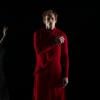
Remember the wunderkind Thomas Adès who burst onto the British music scene in the 1990s, hailed by some as the next Benjamin Britten? Who ruffled feathers with his brash, risque first opera Powder Her Face? Who simulated the pounding, pulsating sounds of a rave in his orchestral tour de force Asyla?
Cue to February 2024. Adès takes the podium at Walt Disney Concert Hall on Sunday afternoon, Feb. 11 — and is barely recognizable with his current shock of white hair at 52. (He’ll be 53 in March.) It took a while, at least until the 2010s, but Adès has fulfilled his early promise, composing what I believe is his first genuine masterpiece, Dante (earlier this month, the Los Angeles Philharmonic’s recording of the ballet was honored with a Grammy Award). Also within the last decade, he wrote another fine work in a traditional format, a Piano Concerto, which stands a good chance of becoming a popular permanent repertory piece. He may be well on the way to becoming a grand British institution; he’s certainly looking the part already.

In the meantime, Adès cuts a livelier figure on the podium than ever. And his program with the LA Phil over the weekend, which paired and compared his own music with that of Maurice Ravel, gave him plenty of opportunities to do so.
For a start, Adès led the local premiere of Five Spells From The Tempest, a 2022 suite from his second opera that distills some of the best music from that 2004 work into a five-movement, 20-minute package. Always a practical marketer of his work (he has produced concert suites from his other two operas as well), Adès takes us quickly through the opera in the order in which it is presented, starting with the “Overture (Storm)” that tries to out-tempest all the musical settings of The Tempest that have come before. The suite made a monster impression in Disney Hall, unleashing a wild, smashing, highly detailed tsunami of sound; the dry, somewhat anemic sonics on the opera’s 2009 recording gives you little idea of what to expect live.
Ariel and Prospero’s music comprises the second movement, Ferdinand and Miranda’s the comparatively lyrical third, the Act 3 feast the fourth, and “Prospero’s Farewell” at the close of the opera forms a serene yet uneasy epilogue. Five Spells ought to take its place beside Britten’s Four Sea Interludes from Peter Grimes and Michael Tippett’s Ritual Dances from The Midsummer Marriage as prime examples of British opera music in the concert hall.
For the benefit of pianist Kirill Gerstein’s fans, the concert offered two concertos for the price of one — or more accurately, one and half concertos since the first entry was Ravel’s Concerto for the Left Hand, still a bargain with its one movement. Both Gerstein and Adès came loaded for bear for this one, with Adès building the orchestral introduction to a boiling point and Gerstein coming in with big stabbing attacks and percussive accents that made good use of the Steinway piano’s huge bass sonorities.
Gerstein returned for the L.A. debut of the aforementioned Adès Piano Concerto, delayed several years by the COVID shutdown. The work’s affinity with Ravel’s concerto became evident late in the first movement, with some semi-jazzy syncopations evoking what we heard before intermission (now that’s good programming). There are also allusions to Sergei Prokofiev’s piano concertos, if no actual quotes, and one wonders whether the cascading octaves near the end were a tribute to, or a parody of, Sergei Rachmaninoff. All the same, this fast-slow-fast concerto in three movements, conceived from tradition, audience-friendly but modernist in its musical language and tricky meter changes, is a lot of fun — and it seems especially fun for a virtuoso like Gerstein, who handled every trap that Adès places in his way with vigor and ease.
Finally came Ravel’s La valse, and for this, Adès really put on a show, swaying to the rhythms, occasionally levitating, right arm spinning like a pinwheel. He shaped the rhetoric with sharp corners and angles, kept the textures clear as glass (with a lot of emphasis on the harps), and crafted an inevitably whiz-bang ending. Some might call it showboating, but you could hear the orchestra responding to almost every eccentric gesture in some positive way. It was fun to watch and a gas to hear.




